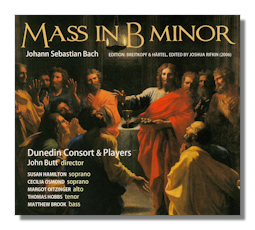
The Internet's Premier Classical Music Source
Related Links
- J.S. Bach Reviews
- Latest Reviews
- More Reviews
-
By Composer
-
Collections
DVD & Blu-ray
Books
Concert Reviews
Articles/Interviews
Software
Audio
Search Amazon
Recommended Links
Site News
 SACD Review
SACD Review
Johann Sebastian Bach

Mass in B minor, BWV 232
Susan Hamilton, soprano
Cecilia Osmond, soprano
Margot Oitzinger, alto
Thomas Hobbs, tenor
Matthew Brook, bass
Dunedin Consort & Players/John Butt
Linn CKD354 2 Hybrid Multichannel SACDs
There are – perhaps somewhat surprisingly – no fewer than 90 recordings of the Bach B minor Mass in the current catalog. To add another is best done with good reason. John Butt, soloists and the Dunedin Consort & Players have at least three. In the first place, Butt has new and apposite interpretative insights – chiefly into the stately, dignified architecture on which this work is built. Secondly, this release is the first to use Joshua Rifkin's one-voice-to-a-part score which has brushed away some of the "improvements" later inflicted on Bach's last masterpiece. Thirdly, this recording sits alongside other works recently recorded by Butt of the larger-scale Bach choral works… notably his excellent recording of the St. Matthew Passion, also on a Linn SACD (CKD313).
The informative booklet that accompanies these two hybrid SACDs speaks of the spectacular and uplifting nature of the B minor Mass. Its author (Butt himself) even terms its choruses "sizzling". Not a few of those 90 recordings implicitly or explicitly try to make the case for an almost "romantic" or Mahlerian conception of the work… a tidal wave sweeping all before it. In some ways they can be forgiven for so doing: we still know all too little about how the B minor Mass was composed, when, or for which occasion, if any. The tradition of nineteenth century (before which time even the "title", Mass in B minor, was not used) was certainly for massive (no pun intended) performances with larger forces than Bach probably had at his disposal in Leipzig.
Yet many of Bach's instrumental works (notably The Art of Fugue) are suitable for widely-varying interpretations because the essence of the music (rather than its mere sound) drives them. So, perhaps, it ought to be for the B minor Mass. And so it seems to be for Butt on this recording. He has realized that the twists and turns of the work's origins, the reuse and revision of various of its parts, the slotting together, perhaps, of repurposed earlier movements can, should, must be detract from the greatness of the work in its entirety.
Indeed, this recording quietly elevates that greatness. It's clear from the stunning opening bars that Butt's idea of the B minor Mass is one of a resoundingly untenatative yet deftly humble and unpresuming but fiercely successful homage – to many things. Yet with the qualities of the Earth as much of Heaven. The brass in the aria and vocal soloists in the following chorus of the Gloria [CD.1 trs. 11, 12], for example, play with such dedicated precision and impact that they're looking as much at us as at a deity. Butt has a sense of the work's gravitas, of its detachment from the everyday world. But a detachment not because backs have been turned on the world. But much of what it has to offer is truly distilled and understood. His tempi and phrasing bespeak such a detachment, for example. At the same time the choruses engage with their music with great enthusiasm. Perhaps in places this jars just a little. More sang froid would have worked just as well. Distance and understanding serve devotion well too.
This is not to say that Butt's B minor Mass is a secular conception. But that there are many ways to serve the spirit – among them infinite care and "attention to detail". A very Calvinist approach. Nor is the spirit drawn or drained from the work. Although perhaps not so ethereal in sentiment as other recordings, this account is full of expression and articulations of the divine. The choral singing, for example, is uniformly uplifting. But because its singers seem themselves already uplifted. Convinced of the strength of their words and notes.
The paradox which Butt seems to have set out to resolve is one between variety and unity. By emphasizing the very disparate natures of the component parts which Bach brought together in his final version of 1748-50, and then leaving any underlying wholeness up to Bach's faith in those parts, Butt has indeed succeeded in allowing the unities of the music to emerge. It helps that his soloists are all pulling in the same directions. And doing so from diverse yet complementary positions of strength. And that the ten vocal soloists who double as choir together with the dozen and a half instrumentalists have all absorbed and internalized the principles and priorities necessary to convey such a conception.
Even the fact that they're performing in a close and natural acoustic, albeit a church (Greyfriars Kirk, Edinburgh) is of a piece with the uncluttered but richly-colored tone of the project. The B minor Mass is dense in places, to be sure. It has often been conjectured that Bach left it as the summation of all that music meant to him and had to offer to later ages. In part this may come from Bach's unusual inclusion of the movements usually omitted from the Lutheran mass, which was not usually sung in Latin either. In any case, this is a huge weight for interpreters to bear. These musicians bear it very well indeed.
With so many other recordings currently competing for our attention, it's important that we have confidence that what we're listening to should bear repetition and continue to illuminate the work allowing us to see past its particularities. This recording does that. Almost to the extent that it's Bach's B minor Mass, not John Butt's. That's quite an achievement.
Copyright © 2010, Mark Sealey.




















